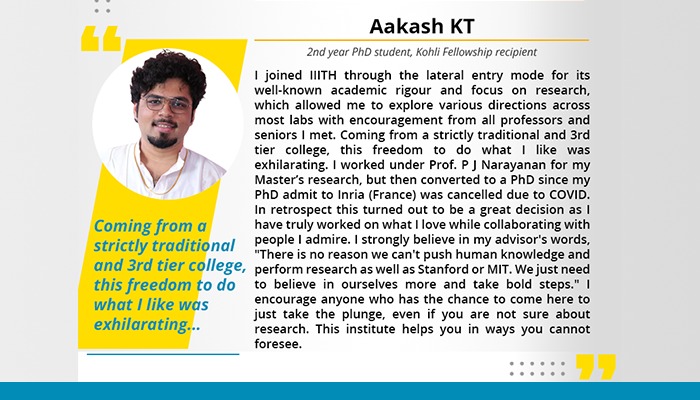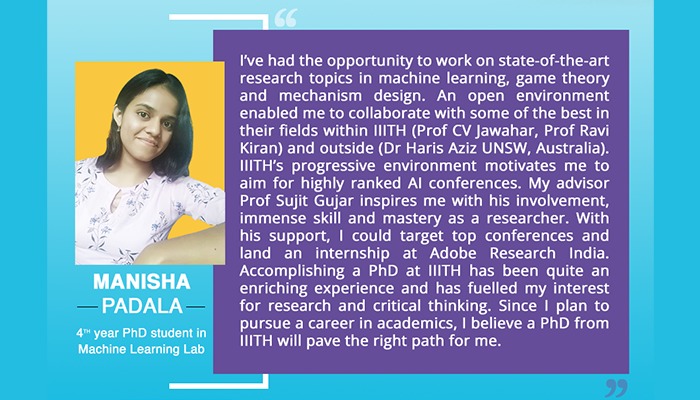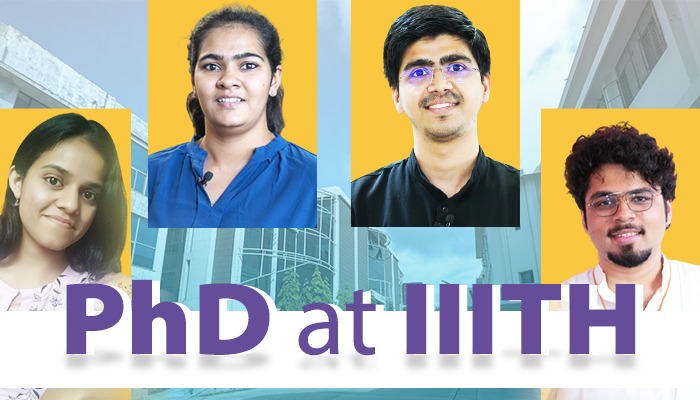If you thought that a PhD after a Bachelors degree is only possible abroad, think again. Here’s how and why anyone with a stellar academic record and a penchant for cutting-edge research can embark on a journey of doctoral research at IIITH.
Kajal Sanklecha was about 6 months into her first job at a fintech company in Bangalore when she decided to give it up and plunge into doctoral research instead. “I was still in my probationary period then,” she recalls. After her BTech, she had opted for an industry placement before realising her heart wasn’t in it. She wanted to explore academia instead. Luckily for Kajal, a previous research experience is not mandatory for admission into a PhD at the International Institute of Information Technology, Hyderabad (IIITH). Ayush Dwivedi who is a 4th year PhD student at IIITH has a similar tale. He joined the doctoral program soon after his BTech too but his tryst with the institute began well before his formal induction into research. “I attended the flagship R&D Showcase programme twice during my BTech years and having learned about the research culture of the institution, I was passionate about joining here,” he says.
According to Prof. Ponnurangam Kumaraguru (PK) who is the Chair for Post-Graduate studies on IIITH campus, admission depends on a candidate’s potential which is gauged through an interview. “We want students to have persistence in working on a problem and willingness to actually put in the effort to contribute to Science, and when they graduate, we want them to be independent researchers,” he says.
Who Should Sign Up?
A Phd is definitely not for the faint-hearted. “It needs passion and dedication,” avers Prof. Sachin Chaudhari, Signal Processing and Communications Research Centre. Equating it to a penance, he says that before embarking upon this journey, introspection is in order. While being passionate about a subject is perhaps a prerequisite, according to him, it helps if one is willing to be a student for life, learning new things and guiding others on the way. “You should ask yourself these questions and see if it strikes a chord with you. Like for instance, do you like the academic way of life, either teaching or research? Or do you like the industry R&D option? Would you like to make a difference and impact society based on the knowledge you have gained and so on.”
As a lateral entry dual degree student, Aakash had his academic appetite vetted before he decided to further his studies. He was all set to pursue a PhD abroad when the pandemic struck and the accepting institution cancelled his admission. Unfazed, he continued with a PhD at IIITH. “I opted for this due to the comfort level with my advisor and the research freedom that the institute provides,” he says. For Manisha Padala too, her raison d’etre for pursuing a PhD at IIITH has been the good rapport she shares with her advisor. What began as a research internship under Prof. Sujit Gujar “to gain more experience in machine learning and game theory” led to a good publication in an acclaimed forum boosting her confidence for further research.

Why IIITH?
“Well, it’s an exceptional place for exceptional people!”, exclaims Prof. Chaudhari, before elaborating on the stimulating collaborative and interdisciplinary research environment that exists in several areas of AI and ML, computer vision, robotics, IoT, smart cities, quantum computing, cognitive science, building science, wireless communication, NLP and many more. To describe a doctoral student’s area of research in a single word is therefore restrictive. “I have had the honour of working in quite a few fields thanks to my advisor. So my work includes machine learning, game theory and mechanism design,” states Manisha, adding that her focus over the last few years has narrowed down on fairness in artificial intelligence to include all groups of people regardless of gender, race, age and so on.
Academic Freedom
While most candidates know what they’re signing up for, in Kajal’s case, she had to acquaint herself with the basics of research and learn what exactly it entailed after coming to IIITH. It helped immensely that she was given the freedom to explore various areas of research before narrowing down on her field of choice – 3D computer graphics. It is this academic freedom that Aakash KT ranks as the winning factor that could persuade anyone to pursue a PhD at IIITH. “Right from selecting your advisor to selecting your research area to even selecting your research centres, the candidate is free to make his or her own informed choices. It allows you to do research in areas that you feel are important to you,” says Ayush.
Keeping It Real
With the institute’s focus on research for societal impact, those especially concerned with real-world problems may find a good fit in undertaking research efforts to solve humanitarian and environmental challenges. When Aakash’s work involved collaborating with Unity research, his dream of making research useful in everyday life turned into reality. “The work on computer graphics we did with them is expected to be integrated into the Unity 3D engine, making rendering even more photorealistic while being in real-time,” he says excitedly. Additionally, the institute works closely with industries translating research into products and boasts of a vibrant start-up ecosystem on campus. But for students, it’s the competent faculty that stand out. Manisha remarks that one need not worry about the future after closely working with the faculty. “It is set to be good. You are guaranteed publications in top conferences and good career prospects at the end of it – whether in academics or industry”.
It’s All About The Money
Research is serious business and funding plays a major role In attracting exceptional doctoral research talent to undertake innovative research. The institute has revised the fellowship amount making it comparable to that awarded in any other institute in the country. “We would like to increase our pool of post graduate applicants. One way we are doing this is by committing to award 20 PhD fellowships of 31-35K per month for 5 years,” says Prof. PK.
Research Culture
An incredibly rewarding experience of a PhD is getting to engage with the academic community through publication of journal articles and papers. Prof. Anoop Namboodiri, Centre for Visual Information Technology, mentions the IIITH culture of publishing research papers at top-notch conferences and says that there are several aspects about publishing which is more than just about research. “You tend to absorb ideas and skills when you work in a group which is consistently publishing at top research places. Plus, you learn a lot from your peers in the research labs. It may be something very specific and related to your own area or may be related to a larger set of problems that others are working in which will help you expand your horizons in understanding the problem.”
Ample Resources
There may be a myriad of reasons why Indian students pursue PhDs at foreign universities, with perhaps an international experience topping the list. As someone who already has 4 strong publications in the area of computer graphics, Aakash says that the decision to go abroad ought to depend on one’s goals and expectations, and not on others. “It is not necessary to follow the herd; do what is best for you. It is also not mandatory that ground-breaking research is possible only via a foreign PhD.” Manisha recommends IIITH for anyone toying with doctoral research by listing the following in no particular order: “A secure campus, convenient location, good food, great lab spaces and lots of computing power”.
Future Prospects
The ‘Why’ of a PhD answers what you want at the end of it. From industry-led research to academic research and teaching, from consulting to policy making, a doctoral degree holder can provide valuable contribution to society. Calling himself an avid researcher, Prof. Sujit Gujar from the Machine Learning Lab who is also an active Quoran with respect to questions about IIITH academics says, “Our PhD alumni are doing very well. Some of them are faculty in IITs, while some of them have joined top research groups like Amazon and MathWorks. Many of our PhD students get opportunities to do research in other top universities like the Swiss Federal Institute of Technology Lausanne (EPFL), University of New South Wales (UNSW) Sydney and others.”
Satisfaction
Often dubbed perilous and tortuous, the path towards a PhD is fraught with its own challenges. Commenting on the ups and downs in the process, Kajal says, “I had to change my problem statement three times,” quickly adding that she is yet to reach the top to really comment on what could have been done differently whilst at the bottom. Despite the uncertainty and despair that is inherent in the process of obtaining the doctoral degree, Science journal, Nature’s survey of PhD students in 2019 revealed that the positives generally outweigh the negatives for a majority of the respondents. In fact about 38% (again, a majority of them) picked “intellectual challenge” as the most enjoyable part about life as a PhD student. For feedback closer home, ask Manisha. “Only two words,” she says with a smile, “Enriching and peaceful”.

Applications are now open for PhD Admissions at IIIT Hyderabad Students with a good academic record and interest in pursuing research can join IIITH’s PhD programs by qualifying through the Postgraduate Entrance Examination (PGEE). Details at https://pgadmissions.iiit.ac.in/pgee/
Apply now! Application deadline 3 April 2022



Next post